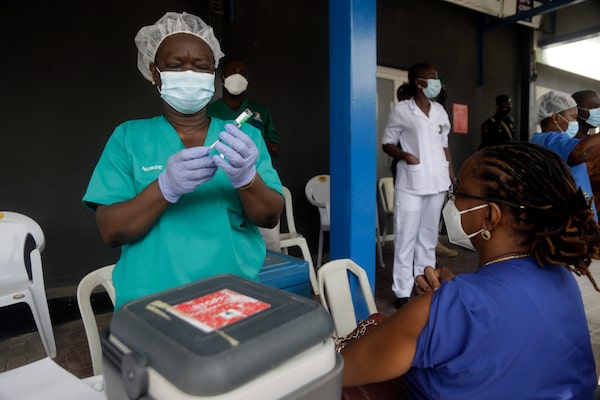
A woman waits to receive one of Nigeria's first coronavirus vaccinations, provided through the global COVAX initiative, in March 2021.Sunday Alamba/The Associated Press
Canada used the G20 summit to announce that it will donate 10 million Moderna COVID-19 vaccines to fight the global pandemic and insisted it would deliver 200 million doses by the end of next year in spite of coming up well short on previous pledges.
Speaking to the media at the Rome summit at the end of the first day of the two-day event, Deputy Prime Minister Chrystia Freeland blamed Canada’s inability to meet previous vaccine delivery commitments on the country’s lack of vaccine infrastructure, which, she said, made supplies difficult to guarantee.
“Canada doesn’t have its own vaccine production,” she said “This is something we directly as a country can’t control. This is a good-faith commitment. We are confident we can meet it by the end of 2022.”
G20 countries endorse global minimum corporate tax at Rome summit
G20 summit predictions: The easy and not-so-easy wins
G20 leaders struggling to commit to climate action, draft shows
She said that the Moderna vaccines would be sent to COVAX “quickly” and that it would boost its financial support to the global vaccine sharing program to allow it to buy another 63 million doses. The financial support for COVAX and direct deliveries would enable Canada to supply 200 million doses, she said.
Canada, however, has not met previous vaccine delivery pledges. At the last G7 summit, in Cornwall, England, in June, Canada said it would donate 40.7 million doses. The figure was later scaled back dramatically and, at last count, only about 3 million had gone out the door.
Wealthy countries such as Canada are under enormous pressure to help end the pandemic by boosting vaccine supplies to the developing world. On average, the G20 countries have vaccinated about 55 per cent of their eligible populations. Globally, the figure is 38 per cent; in Africa, only 7 per cent.
On Saturday, Italian Prime Minister Mario Draghi, host of the G20, called the unequal vaccine distribution “startling” and called on the G20 countries to move fast to help cover the shortfalls.
The deliveries of the Moderna vaccine, which uses the mRNA technology, mark a departure for Canada. The country had previously promised to deliver mostly AstraZeneca vaccines, whose technology is considered somewhat less effective. “It’s good that Canada is finally committing to share its excess mRNA vaccines with countries in need, but at this critical stage, it’s all about timely delivery,” said Friederike Roder, vice-president of global advocacy at Global Citizen, an education and anti-poverty advocacy group.
At the G20, Canada also pledged to invest C$15-million to help build vaccine manufacturing capability in South Africa for mRNA vaccines and donate 20 per cent of its International Monetary Fund special drawing rights (SDRs) to support pandemic recovery in developing countries.
SDRs are a reserve financial asset that can be traded among countries in exchange for liquidity or cash, and can act as emergency global stimulus spending. The value of the donated Canadian SDRs is about C$3.7-billion. Canada is the third country to donate SDRs, after France and the U.K.
COVAX has been able to deliver only about 150 million vaccines in spite of promises from wealthy countries that 1.3 billion were in the pipeline. COVAX ran into problems when the Serum Institute of India, the world’s largest supplier of vaccines, curtailed exports so it could supply the vast Indian market. Unless the Serum Institute restores exports, COVAX deliveries may come up short for some time.
Tedros Ghebreyesus, director-general of the World Health Organization, asked G20 leaders to donate another 550 million doses immediately to ensure that at least 40 per cent of the world’s population can be vaccinated by the end of the year. “Promises aren’t translating into vaccines reaching the people that need them,” he said in an open letter.
Climate change was the other pressing issue at the G20. Most of the G20 leaders will leave Rome Sunday night for Glasgow, the site of the COP26 climate change conference and do not want to arrive empty handed. The aim of COP26 is to convince countries to reveal more ambitious carbon-reduction pledges to keep global warming in check.
But a draft G20 communiqué seen by Reuters and other news agencies suggests the G20 countries are likely to reveal only slight improvements to their existing previous pledges. Ambitious new reduction targets seem unlikely.
The G20 also hopes to negotiate a date for the phase out of coal-burning electricity generation and boost financing for climate change adaptation and mitigation in the developing world. Wealthy countries pledged 12 years ago, at the Copenhagen climate summit, to funnel US$100-billion a year to fund this effort. That level has never been achieved.
An earlier version of this article incorrectly said Canada pledged to invest C$15-billion to help build vaccine manufacturing capability in South Africa. It is C$15-million.
 Eric Reguly
Eric Reguly